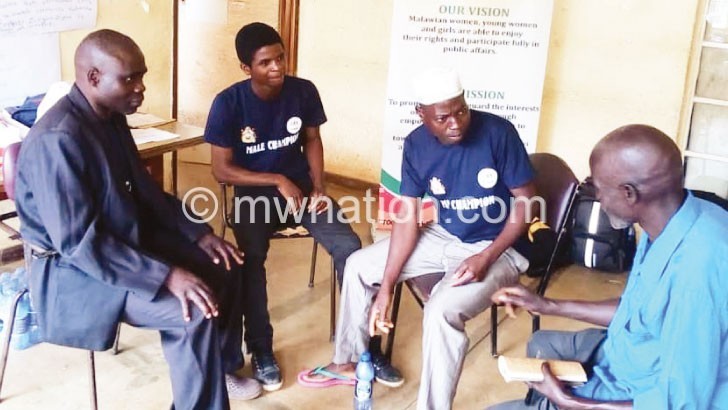Men taking lead in PMTCT
Being a promoter for his area’s care group was one of the greatest attributes that made 30-year-old Enock Chingalangala of Mwambirako Village, Traditional Authority Kasakula in Ntchisi to volunteer as a male champion.
“I already had the capacity to help people in various ways, including changing their mindsets on certain beliefs and behaviours. One challenge that affected our area was the refusal most men to take part in safe motherhood and HIV and Aids issues.

“We are used to discuss about issues of health, nutrition and well-being when we convene for the care group meetings, but we did not talk much on HIV related issues, especially for men to take a leading role,” he said.
Chingalangala was among the 20 male champions in Ntchisi, selected by health personnel to lead in prevention of mother to child transmission (PMTCT) of HIV.
A farmer by profession, the father of three starts off every day to wherever people are gathered to sensitise married men and grown up boys on matters about their health.
On how he manages to disseminate information, he said: “I normally use the opportunity of any gathering in the community to deliver messages of safe motherhood which include going for voluntary counselling and testing for HIV by expectant mothers together with their husbands.”
Chingalangala said the male champions were trained by the Coalition for the Empowerment of Women and Girls (Cewag) on how they can approach people in their areas on such issues.
“There is a change now, women are delivering in the hospitals and most couples know their HIV status which is encouraging to us. This means we are doing our job right and we believe soon enough everyone in the country will adopt what we are doing here to make our communities better places for mothers and children,” he said.
Women, in the area, who go for antenatal clinics with their husbands, are attended to first, a move that has motivated many men escorting their wives to the hospital.
“Any woman who does not give birth at the hospital is supposed to pay a fine of K5 000 which is a lot of money for a villager who does not have a solid income generation activity.
“This has made it easy to force women to start treatment if they are diagnosed HIV positive and if they are negative that’s even better because the family now knows how it can protect itself from the virus; hence, protecting their unborn children,” added Chingalangala.
In 2014, Adamson Muula and colleagues established in their study on The Relevance of Male Involvement in PMTCT in Malawi that male involvement remains low despite the progress registered in the implementation of the PMTCT programme in the country.
“Male involvement in PMTCT is a fairly new concept in Malawi that has not been fully implemented within PMTCT service provision despite its inclusion in the PMTCT guidelines.
“One of the reasons for the limited male involvement is the lack of knowledge on both its relevance and the role of men in the programme as currently men have been encouraged to participate in PMTCT services without prior research on their understanding of the relevance and their role in PMTCT,” states the research findings.
Cewag executive director Beatrice Mateyo said one way of empowering women and girls in their communities is having men to take part in protecting the health of their wives.
She said: “It takes a man and a wife to make children and making sure the family lives a healthy life is a responsibility of the two. If they go for HIV testing together, they would be on the lookout of the spouse’s life and this is what we want to achieve as it will result in creating a healthy generation.”
According to Elizabeth Glaser Paediatric Aids Foundation (Egpaf), despite the launch of Option B+ in Malawi and a 66 percent reduction rate in mother to child transmission of HIV, there are still women who do not access PMTCT services or leave PMTCT programmes which makes the case identification of HIV positive infants a challenge.
In 2015, paediatric anti-retroviral treatment (ART) coverage was at 49 percent and improved slightly to 63 percent in 2016 which is still far from the universal coverage which is at 90 percent in the country.
However, a 2019 report by Journalists Association against Aids (JournAids) called Strengthening Advocacy for PMTCT in Vulnerable Communities indicates that various interventions have helped men to understand their role in PMTCT.
“Men did not understand that going together with their spouses to get tested will help the families to have healthy children born to positive mothers they thought that if they become sick they should seek help from the traditional doctors and not in hospitals, thinking that they have been bewitched,” states the report.
JournAids chairperson Christopher Bauti said for the country to achieve PMTCT there is need for communities to be educated on the relevance of male involvement as well as alerting them on the consequences of lack of male involvement for the success of the service. Sustainable Development Goal three indicates the need for countries to end the AIDS pandemic by 2030 and that reduced number of new HIV infections per 1 000 should be an indicator for progress.





